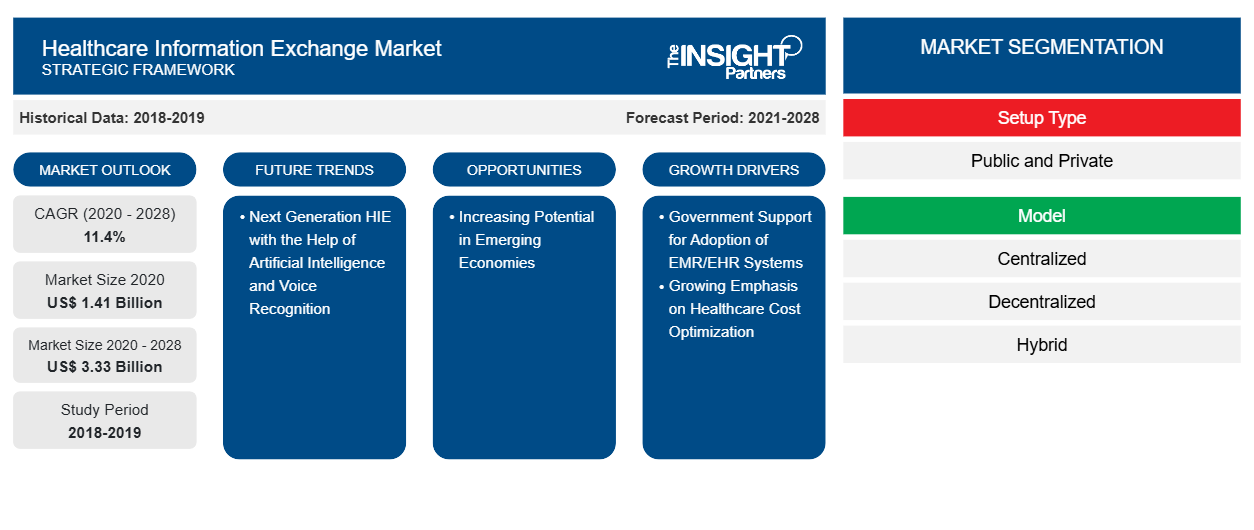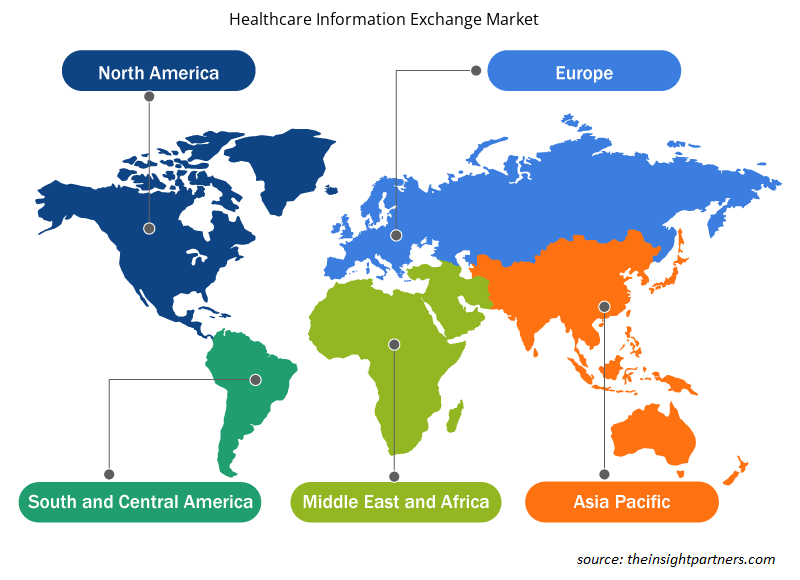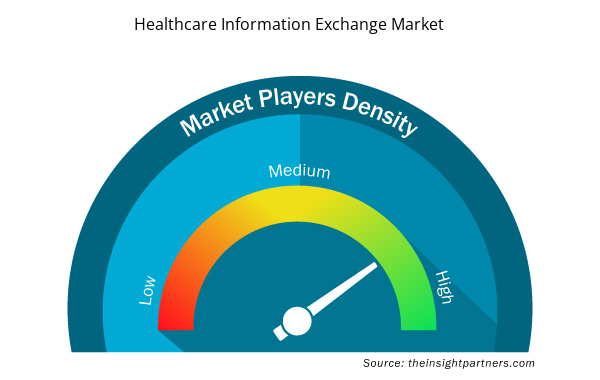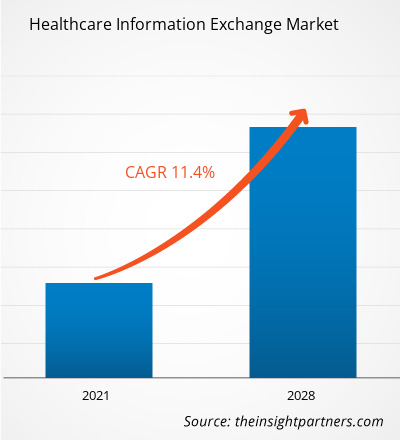The healthcare information exchange market was valued at US$ 1,411.56 million in 2020 and is projected to reach US$ 3,326.98 million by 2028; it is expected to grow at a CAGR of 11.4% from 2021 to 2028.
Market Insights and Analyst View:
HIEs are essential for connecting communities and ensuring patient health records are always accessible. Healthcare information exchange (HIE) is an integral and significant element of healthcare information technology (HIT) infrastructure. HIE refers to the deployment of healthcare information electronically. Government support for implementing EMR/EHR systems and a growing emphasis on healthcare cost optimization are the primary factors fueling the growth of the healthcare information exchange market globally. Also, the growing adoption of technologically advanced products in healthcare facilities to treat chronic diseases is fueling the growth of the healthcare information exchange market.
Growth Drivers:
The growing awareness about the use of healthcare information exchange for easy access to patient data at any healthcare facility is fueling the growth of the healthcare information exchange market. The rapid growth of healthcare information technology has led to an increase in the exchange of medical information for patients through EHRs. These systems are used to collect patient information and also share it with other healthcare professionals who are involved in the patient's care. Healthcare authorities, market players, and governments are actively adopting the adoption of EHR systems to modernize the process of healthcare activities. In addition, these systems gather efficient data and exchange it, allowing healthcare professionals to improve the quality of the treatment.
In 2001, the Canadian government launched a strategic initiative to modernize its ICT infrastructure in healthcare and promote the adoption of EHRs. According to data published on NCBI, in 2015, around 91.0% of Canadians registered their data on EHRs, and about 91,000 physicians were using EHR systems for day-to-day work. Moreover, according to a survey by the Canadian Medical Association, ~85.0% of Canadian physicians were using EMR systems in 2017. Also, as per the data published by the Canada Health Infoway in 2020, EHR data is available for around 93.8% of Canadians.
Customize This Report To Suit Your Requirement
You will get customization on any report - free of charge - including parts of this report, or country-level analysis, Excel Data pack, as well as avail great offers and discounts for start-ups & universities
Healthcare Information Exchange Market: Strategic Insights

- Get Top Key Market Trends of this report.This FREE sample will include data analysis, ranging from market trends to estimates and forecasts.
Customize This Report To Suit Your Requirement
You will get customization on any report - free of charge - including parts of this report, or country-level analysis, Excel Data pack, as well as avail great offers and discounts for start-ups & universities
Healthcare Information Exchange Market: Strategic Insights

- Get Top Key Market Trends of this report.This FREE sample will include data analysis, ranging from market trends to estimates and forecasts.
In 2002, England announced the launch of the National Plan for IT, a new initiative to enhance the functionalities of the existing healthcare system. Moreover, in 2012, the government passed the Health and Social Care Act to use patient’s information for research purposes. Such initiatives in the UK are anticipated to drive the adoption of EHR systems in the country. In Germany, an estimated 90% of physicians in private practice use EHR systems as of 2020. Further, according to data published on NCBI in 2020, the EHR adoption rate in New Zealand has reached around 97%. Also, the government of India has launched the Transforming India Mission to generate digital health records of all Indian citizens by 2022. Government initiatives for the adoption of EHR systems eventually propel the growth of the healthcare information exchange market.
Report Segmentation and Scope:
The “Global Healthcare Information Exchange Market” segmentation is done based on setup type, model, deployment, application, component, end user, and geography. Based on setup type, the market is bifurcated into public and private. Based on the model, the healthcare information exchange market is segmented into centralized, decentralized, and hybrid. Based on deployment type, the market is bifurcated into cloud-based and on-premise. Based on application, the market is segmented into workflow management, internal interfacing, web portal development, and others. Based on components, the market is segmented into enterprise master person index, healthcare provider directory, record locator service, clinical data repository, and others. Based on end users, the healthcare information exchange market is segmented into public health agencies, healthcare providers, and others. The healthcare information exchange market based on geography is segmented into North America (US, Canada, and Mexico), Europe (Germany, France, Italy, UK, Russia, and the Rest of Europe), Asia Pacific (Australia, China, Japan, India, South Korea, and the Rest of Asia Pacific), Middle East & Africa (South Africa, Saudi Arabia, UAE, and the Rest of Middle East & Africa), and South & Central America (Brazil, Argentina, and the Rest of South & Central America).
Segmental Analysis:
Based on setup type, the healthcare information exchange market is segmented into public and private. In 2022, the private segment held the largest market share of the healthcare information exchange market, by setup type. Moreover, the same segment is expected to grow at the highest CAGR from 2022 to 2030. The need for health information exchange (HIE) to transform the healthcare system has become more evident, and the number of health information exchange initiatives (HIEs) has grown exponentially. Over the last several years, private health information exchanges (HIEs) have become a feasible alternative to public model exchanges. Generally, unlike most public HIEs, private HIEs are concentrated in a single community, financed by private healthcare organizations, and do not rely upon public funding. These private models have witnessed significant growth in the marketplace recently. Moreover, there is involvement of private healthcare information providers and a high level of physician engagement at each information system level. In addition, associated benefits, such as high workflow efficiency and fewer governance issues, are expected to increase the adoption rate over the forecast period.
Based on deployment type, the healthcare information exchange market is bifurcated into cloud-based and on-premise. In 2022, the on-premise companies segment held the largest healthcare information exchange market share. However, the cloud-based segment is anticipated to grow at the highest CAGR during 2022-2030. Hospitals or other healthcare entities use on-premises to view patient imaging data efficiently. An on-premise delivery solution enables programs to be installed and run on computers on the facility's premises. The on-premise deployment offers a cost-efficient and entirely HIE solution for any practice of any size. The on-premises answer is a business model used in the traditional approach. These solutions are available in various forms to outsource the hardware to use the software in a hosted solution. With an on-premise deployment of imaging management software solutions in hospitals, it is possible to tackle overcrowding in emergency departments and inefficient scheduling for various procedures easily. The cooling cost is also a significant expense to guarantee the servers do not break down. An on-premise solution helps reorganize patient admissions and handoffs, even surgical arrangements and optimizing discharges. Hence, owing to these factors, the demand for the on-premise delivery mode is anticipated to witness significant growth during the coming years.
Based on application, the healthcare information exchange market is segmented into workflow management, internal interfacing, web portal development, and others. In 2022, the web portal development companies segment held the largest healthcare information exchange market share. However, the internal interfacing segment is expected to grow at the highest CAGR from 2022 to 2030. Workflow management is the process of coordinating the activities that make up an organization's work. A series of tasks that are part of a broader undertaking is referred to as a 'workflow,' and it is often used interchangeably with the term 'business process.' To apply people-oriented change management and process improvement strategies, the MeHI has worked with representatives from 12 healthcare organizations so that they can improve the workflow on the receiving side of HIE. Three interactive sessions were carried out, in which the participants reviewed the change management and then processed the mapping concepts. After that, they applied the mapping concepts to the challenges organizations face after receiving healthcare documents via HIE. Demand for healthcare interfaces is rising, and healthcare entities are working rapidly to connect various internal applications and external resources.
Regional Analysis:
Based on geography, the healthcare information exchange market segments into five key regions: North America, Europe, Asia Pacific, South and Central America, and Middle East and Africa. In 2022, the North American healthcare information exchange market held the largest share of the global healthcare information exchange market. The Asia Pacific healthcare information exchange market is estimated to show the highest CAGR during the forecast period. The market for healthcare information exchange in the North American region is also likely to grow with the presence of various key players. In addition, the adoption of digital tools in healthcare operations for improving quality and reducing costs simultaneously is also responsible for augmenting the growth of the health information exchange market in the region. In North America, the US is the largest market for healthcare information exchange. The growth of this market is primarily driven by the increasing adoption of EHR/EMR systems, the increasing prevalence of chronic diseases, and support from the federal government to implement digital tools in healthcare.
Furthermore, the rising emphasis on cost optimization and consolidation of healthcare IT infrastructure is also responsible for market growth in the country. The US has one of the highest healthcare costs in the world. It’s home to the world’s leading multinational corporations, such as Microsoft, Intel, Google, NVIDIA, Johnson & Johnson, and many more. It tends to have the most cutting-edge treatments. All this contributes to higher market growth in the region. Moreover, healthcare institutions in the US are also focusing on adopting advanced healthcare information systems to elevate the level of functionalities. Moreover, continual development in the information technology field offers better options for healthcare professionals to analyze and exchange patient data. For instance, in May 2023, Rush Health and Ready Computing successfully deployed the first phase of Rush Health Connect. This information technology solution enables Rush Health members to share health information securely and efficiently. Rush Health is a leading clinically integrated network of hospitals and physicians, including about 1,100 physicians and 300 other Chicago clinicians. The company partnered with Ready Computing, a services consulting firm specializing in HIE implementations, to implement and customize InterSystems HealthShare, the platform supporting Rush Health Connect.
Healthcare Information Exchange Market Regional Insights
The regional trends and factors influencing the Healthcare Information Exchange Market throughout the forecast period have been thoroughly explained by the analysts at Insight Partners. This section also discusses Healthcare Information Exchange Market segments and geography across North America, Europe, Asia Pacific, Middle East and Africa, and South and Central America.

- Get the Regional Specific Data for Healthcare Information Exchange Market
Healthcare Information Exchange Market Report Scope
| Report Attribute | Details |
|---|---|
| Market size in 2020 | US$ 1.41 Billion |
| Market Size by 2028 | US$ 3.33 Billion |
| Global CAGR (2020 - 2028) | 11.4% |
| Historical Data | 2018-2019 |
| Forecast period | 2021-2028 |
| Segments Covered |
By Setup Type
|
| Regions and Countries Covered | North America
|
| Market leaders and key company profiles |
Healthcare Information Exchange Market Players Density: Understanding Its Impact on Business Dynamics
The Healthcare Information Exchange Market market is growing rapidly, driven by increasing end-user demand due to factors such as evolving consumer preferences, technological advancements, and greater awareness of the product's benefits. As demand rises, businesses are expanding their offerings, innovating to meet consumer needs, and capitalizing on emerging trends, which further fuels market growth.
Market players density refers to the distribution of firms or companies operating within a particular market or industry. It indicates how many competitors (market players) are present in a given market space relative to its size or total market value.
Major Companies operating in the Healthcare Information Exchange Market are:
- eClinicalWorks
- Allscripts Healthcare, LLC
- General Electric Company
- Cerner Corporation
- Orion Health group of companies
Disclaimer: The companies listed above are not ranked in any particular order.

- Get the Healthcare Information Exchange Market top key players overview
Industry Developments and Future Opportunities:
Various initiatives taken by key players operating in the global healthcare information exchange market are listed below:
- In March 2023, Fujitsu launched a new cloud-based platform that allows users to collect and leverage health-related data securely to promote digital transformation in the medical field. The new platform supports the automatic conversion of medical data from medical institutions' EMRs using HL7 FHIR, the next-generation standards framework, and secure health-related data. Based on the medical institution's consent, patients can securely store personal health information such as step counts, vital data, and calorie consumption, which is converted into non-personally identifiable information by the platform. This, in turn, supports pharmaceutical companies and medical institutions in performing data analysis and R&D activities, accelerating the development of individualized healthcare and the discovery of new drugs.
Competitive Landscape and Key Companies:
Some of the healthcare information exchange market leaders are Oracle, eClinicalWorks, Allscripts Healthcare LLC, GE Healthcare, Health Catalyst, Inc., Orion Health group of companies, Nextgen Healthcare Information System LLC, Optum, Inc., McKesson Corporation, and Ciracet. These companies focus on product launches and expansions geographically to meet the increasing consumer demand worldwide and increase their product range in specialty portfolios. These companies have a widespread global presence, which allows them to serve a large set of customers and subsequently increase their market share. The report offers a trend analysis of the healthcare information exchange market emphasizing on various parameters such as market dynamics, technological advancements, and competitive landscape analysis of leading market players across the globe.
- Historical Analysis (2 Years), Base Year, Forecast (7 Years) with CAGR
- PEST and SWOT Analysis
- Market Size Value / Volume - Global, Regional, Country
- Industry and Competitive Landscape
- Excel Dataset



Report Coverage
Revenue forecast, Company Analysis, Industry landscape, Growth factors, and Trends

Segment Covered
Set Up , Type , Implementation Model , Application , End User , and Deployment , and Geography

Regional Scope
North America, Europe, Asia Pacific, Middle East & Africa, South & Central America

Country Scope
Argentina, Australia, Brazil, Canada, China, France, Germany, India, Italy, Japan, Mexico, Saudi Arabia, South Africa, South Korea, Spain, United Arab Emirates, United Kingdom, United States
Frequently Asked Questions
HIEs are crucial for connecting communities and ensuring patient health records are always available. Healthcare information exchange is an integral and significant element of health information technology (HIT) infrastructure. Healthcare information exchange refers to the deployment of healthcare information electronically.
The healthcare information exchange market majorly consists of the players such as eClinicalWorks, Allscripts Healthcare, LLC, General Electric Company, Cerner Corporation, Orion Health group of companies, Health Catalyst, Inc., Nextgen Healthcare Information System, LLC, McKesson Corporation, Optum, Inc., and Oracle Corporation. amongst others.
The growth of the market is attributed to some key driving factors such as government Support for Adoption of EMR/EHR systems and growing emphasis on healthcare cost optimization.
Trends and growth analysis reports related to Technology, Media and Telecommunications : READ MORE..
The List of Companies - Healthcare Information Exchange Market
- eClinicalWorks
- Allscripts Healthcare, LLC
- General Electric Company
- Cerner Corporation
- Orion Health group of companies
- Health Catalyst, Inc.
- Nextgen Healthcare Information System, LLC
- McKesson Corporation
- Optum, Inc.
- Oracle Corporation

 Get Free Sample For
Get Free Sample For